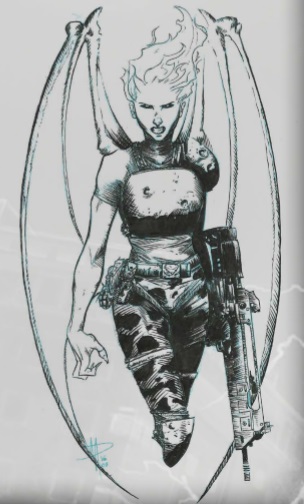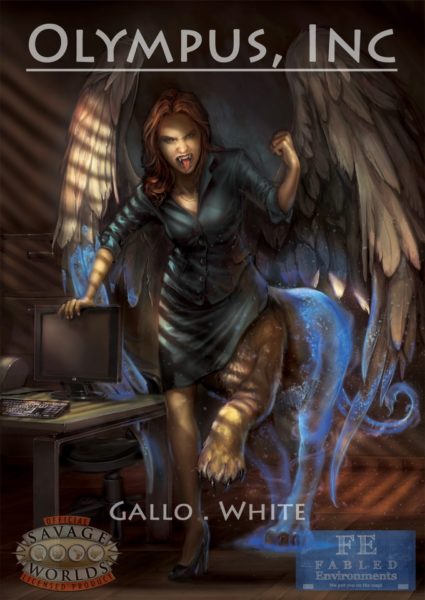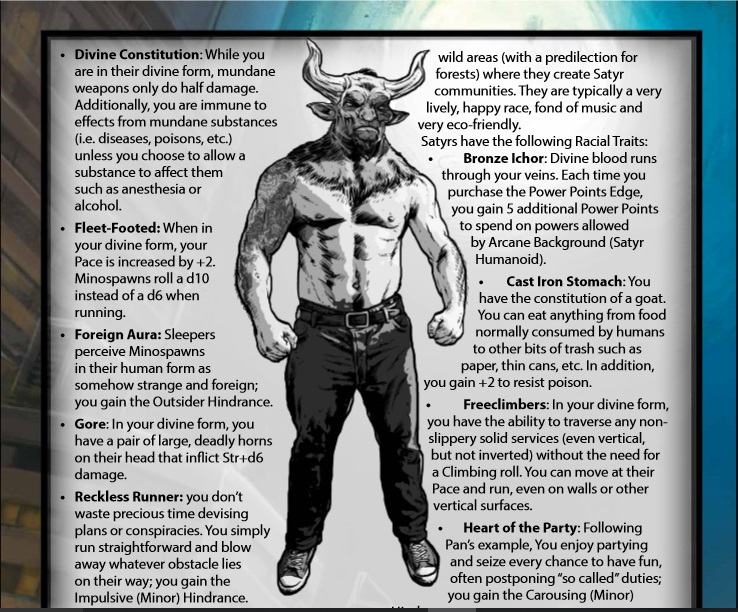Olympus Inc., a modern day setting for Savage Worlds written by Gilbert Gallo and Charles White (produced by Fabled Environments), is a setting in which the world is controlled by shadow groups. These groups are very powerful, and exert their influence to further their own goals. Unlike most worldwide corporate conglomerates, however, this power does not simply come from significant wealth and connections. In Olympus Inc, the power comes from the deities of the Ancient Greek pantheon.
 The setting’s alternate history asserts that Zeus, Aphrodite, Ares, and the rest of the Olympic Pantheon were cast out of Olympus, and have been sealed on Earth with diminished powers. Making the best of a bad situation, the gods made use of what strength they had left to take control of mortal organizations. They continued to grow their power into the modern day, in which they now control multinational conglomerates. All the while, the mythical titans have been seeking to undo all the gods have worked for, and have raised their own terrorist organization to undermine the gods’ authority.
The setting’s alternate history asserts that Zeus, Aphrodite, Ares, and the rest of the Olympic Pantheon were cast out of Olympus, and have been sealed on Earth with diminished powers. Making the best of a bad situation, the gods made use of what strength they had left to take control of mortal organizations. They continued to grow their power into the modern day, in which they now control multinational conglomerates. All the while, the mythical titans have been seeking to undo all the gods have worked for, and have raised their own terrorist organization to undermine the gods’ authority.
My first impression of Olympus Inc was mixed. It felt jarring to have figures that are so firmly rooted in the past running modern corporations. I had a hard time coming up with an idea of what player characters would do in such a setting. However, the background presented by the book does a good job of making the setting feel cohesive by taking a few liberties with the traditional mythological framework. Furthermore, the character creation section conveniently includes four examples of typical groups and goals of a campaign, and each suggestion has a particular flavor. It’s refreshing to have these options outlined but not mandated, as it provides inspiration for both player and GM. These guidelines can provide inspiration for a Shadowrun-style group of outlaws out for money, a cloak and dagger conspiracy campaign, or a loyal group of corporate workers who are loyal to their deity.
Outside of the Olympian influence, the setting has a cyberpunk feel to it. Corporate drones are victims to the whims of powerful beings while having very little agency themselves. Shadowy mega-corporations are often more powerful than governments, and they are all concerned with their own interests. Cybernetic augmentation is absent, but in its place is the insurmountable difference between mortal and divinity. Finally, it’s rather difficult to find a “good guy.” The titans are fighting against the Olympians’ control of the world, but it’s through the use of terrorist organizations, and the end goal is to restore the Titans’ power. The Olympians are just as vain and flawed as they are in the original Greek myths, but the player characters are personally invested in ensuring their continued positions of power. It’s a rather grim setting for the mortals. Strangely, however unintuitive it may be, this actually helps to unify the themes of Greek mythology and the cyberpunk genre. Both show how the powerful have little to no concern for the weak masses they have domain over, and both can illuminate the flaws that are inherent in humanity.
As one might imagine, each god has tailored their corporation to roughly match the domains that they are known for in popular culture. It’s fun to read through how each god has found a way to influence modern practices. For example, Aphrodite deals in cosmetics, online dating services, and (allegedly) prostitution. In fact, a lot of the fun in the setting comes from the creative ways in which these Olympian gods have been brought forth into the technology and sensibilities of today. It is a bit disappointing that only 6 of the gods (Aphrodite, Apollo, Ares, Dionysus, Hermes, and Zeus) are given an in-depth explanation in the core book, especially since the other gods are given distinct mentions and roles in the overview of the setting’s history. Nonetheless, 6 deities and a few lesser gods are plenty to give characters enough options to build a unique demigod.
 Speaking of demigods, they were affected by the gods’ banishment from Olympus as well. Since the gods were thrown out of Olympus, demigods are no longer simply born into power. Instead, the power of the bloodline sleeps until a significant tragedy or pain is inflicted on a demigod, at which point the power is revealed (typically in a way that results in the deaths of those responsible for the pain). It is intended for player characters to be demigods who take part in the shadow war between gods and titans, whether they care about the war or not. As such, player characters are free to act of their own accord, although they may have strong ties to a particular god.
Speaking of demigods, they were affected by the gods’ banishment from Olympus as well. Since the gods were thrown out of Olympus, demigods are no longer simply born into power. Instead, the power of the bloodline sleeps until a significant tragedy or pain is inflicted on a demigod, at which point the power is revealed (typically in a way that results in the deaths of those responsible for the pain). It is intended for player characters to be demigods who take part in the shadow war between gods and titans, whether they care about the war or not. As such, player characters are free to act of their own accord, although they may have strong ties to a particular god.
Mechanically, the setting introduces a few new ideas, and creatively repurposes a few old ones. Character generation produces a higher power level than a typical Savage Worlds setting due to a reinterpretation of the Super Powers handbook. Many of the same mechanics are used, but the powers are re-flavored as deific capabilities appropriate for each god. The power level does conflict somewhat with the cyberpunk-esque feeling of the rest of the setting. Nonetheless, the necessity to keep their activities a secret typically prevents characters from walking down the street and firing lightning bolts at buildings. Olympus Inc also introduces alchemy, which allows players to produce potions that give trait boosts or even access the powers of gods outside the character’s bloodline. The mechanics behind it aren’t revolutionary, but they can give a character something useful to do in their downtime if they choose to invest in the edges and skill necessary. The new edges follow the higher power curve, occasionally completely eclipsing the edges in the core book. Considering that player characters are demigods, this isn’t as big a problem as it would be in more low power settings.
The book itself is pleasing to look at overall. Art throughout the book varies in quality, from professional full color art, to black and white cartoons, to the occasional stylized photograph. The layout is logical, and it’s easy to find info in a hurry. There are some noticeable typos throughout the book. None of them are bad enough to render the book unusable, but they can certainly draw a reader out of the flow of things.
 Olympus Inc takes two seemingly completely disparate elements, and fuses them in a way that is surprisingly convincing, thematically coherent, and, most importantly, fun. It’s not perfect, and different groups will probably have to alter some parts of the setting to suit their own taste, but the whole is more than the sum of its parts.
Olympus Inc takes two seemingly completely disparate elements, and fuses them in a way that is surprisingly convincing, thematically coherent, and, most importantly, fun. It’s not perfect, and different groups will probably have to alter some parts of the setting to suit their own taste, but the whole is more than the sum of its parts.
For fans of cyberpunk who want to infuse some fantastical elements into their world, Olympus Inc may be the perfect setting. Similarly, for fans of Greek mythology who want to tell some stories with a more contemporary feel, the setting offers a unique platform to launch from. Finally, for the rare individual who has always loved both and wanted to merge the two, this setting finally offers a chance to point and say “See!? I told you it would work!”
You can get it here…




It is definitely on my list of things that I intend to pick up, Greek Myth and Cyberpunk? Yes, please!
I certainly enjoyed reading it.
Wow guys thank you for this great review! And it was released on my birthday! I could not ask for more! 😀
You’re welcome! 🙂